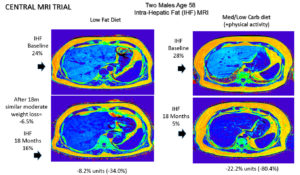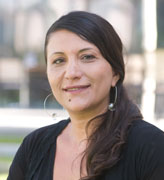
Your Scale Isn’t Giving You the Whole Picture
Your Scale Isn’t Giving You the Whole Picture
November 27, 2017
Medical Research, Press Releases
A new, long-term diet study published in the high impact American Heart Association journal, Circulation, used MRI imaging technology for the first time to plot the diverse changes in an array of body organ fat storage pools during 18 months of Mediterranean/low-carb (Med/LC) and low-fat diets, with and without moderate physical exercise.
The CENTRAL MRI is a randomized, controlled trial conducted at Ben-Gurion University of the Negev (BGU), in collaboration with the Dimona Nuclear Research Center and Soroka University Medical Center in Israel, as well as Harvard University and Leipzig University in Germany.
The research group, led by Prof. Iris Shai, Dr. Yftach Gepner, Dr. Ilan Shelef, and Dr. Dan Schwarzfuchs from BGU, and Dr. Meir Stampfer from Harvard University, sought to assess how lifestyle strategies would impact specific body (adipose) fat deposits.
To map these deposits, they collected an unprecedented quantity of whole body MRI data in benchmark six-month and 18-month scans, each with 300 data points, from moderately overweight to obese men and women.
“Weighing patients or using blood tests to detect changes, hasn’t, until now, given us accurate pictures, literally, of how different fat deposits are impacted disproportionately by diet and exercise,” says Prof. Iris Shai, the primary investigator of the CENTRAL MRI trial.
“These findings suggest that moderate exercise combined with a Mediterranean/low carb diet may help reduce the amount of some fat deposits even if you don’t lose significant weight as part of the effort.”

This illustration compares moderate weight loss for two men of similar age, baseline weight, waist circumference, and visceral fat proportion. It shows that a MED/LC diet and physical activity induces far greater intra-hepatic fat loss (28% to 5%) as compared to a low-fat diet (24% to 16%).
In the study, even with only moderate weight loss, the Med/LC diet was found to be significantly superior to a low-fat diet in decreasing some of the fat storage pools, including visceral (abdominal deep), intra-hepatic (liver), intra-pericardial (heart), and pancreatic fats. However, fat deposits in renal-sinus (kidney), femoral-intermuscular or the cervical (neck) were only altered by weight loss and not by specific lifestyle strategies.
The various fat deposits exhibited highly diverse responsiveness to the interventions, along with moderate, long-term weight loss. In general, the greatest fat deposit decreases were hepatic (-29 percent), visceral (-22 percent) and intra-pericardial (-11 percent). Pancreatic and femur intermuscular fat deposits were only reduced one to two percent.
“We learned in this trial that moderate, but persistent, weight loss may have dramatic beneficial effects on fat deposits related to diabetes and cardiovascular diseases,” Prof. Shai explains. A Mediterranean diet, rich in unsaturated fats and low in carbohydrates, was a more effective strategy than an iso-caloric low-fat diet to dramatically reverse morbid fat storage sites.
The 18-month trial included 278 sedentary adults in an isolated workplace, the Nuclear Research Center, with a monitored lunch provided. The participants were randomized to iso-caloric low-fat or Med/LC diet plus 28 grams of walnuts per day with or without an added moderate workout at least three times weekly and a supervised, free gym membership.
The CENTRAL MRI trial followed the groundbreaking DIRECT two-year trial (NEJM 2008) and its four-year follow-up (NEJM 2012). These found that Med/LC diets were effective in improving the cardio-metabolic state and in reversing carotid atherosclerosis (Circulation 2010). Based on those findings, the researchers asked whether internal body fat redistribution, rather than mild weight loss differences between the diets, may underline the significant health benefits attributed to Med/LC diets.
The researchers also found that the decline in hepatic fat and each one of the abdominal fat deposits had specific related health outcomes. After controlling for several parameters, losing visceral fat or hepatic fat were independently associated with improved lipid profile. Losing deep subcutaneous fat was associated with improved insulin sensitivity, and losing superficial subcutaneous fat remained neutral, except for association with decreased leptin hormone.
“In conclusion, the CENTRAL study demonstrates that improving nutritional quality and being physically active can improve cardio-metabolic risk markers through changes in visceral/ectopic fat deposits that are not reflected by changes in body weight alone,” Prof. Shai says.
ABOUT AMERICANS FOR BEN-GURION UNIVERSITY
By supporting a world-class academic institution that not only nurtures the Negev, but also shares its expertise locally and globally, Americans for Ben-Gurion University engages a community of Americans who are committed to improving the world. David Ben-Gurion envisioned that Israel’s future would be forged in the Negev. The cutting-edge research carried out at Ben-Gurion University drives that vision by sustaining a desert Silicon Valley, with the “Stanford of the Negev” at its center. The Americans for Ben-Gurion University movement supports a 21st century unifying vision for Israel by rallying around BGU’s remarkable work and role as an apolitical beacon of light in the Negev desert.
About Ben-Gurion University of the Negev
Ben-Gurion University of the Negev embraces the endless potential we have as individuals and as a commonality to adapt and to thrive in changing environments. Inspired by our location in the desert, we aim to discover, to create, and to develop solutions to dynamic challenges, to pose questions that have yet to be asked, and to push beyond the boundaries of the commonly accepted and possible.
We are proud to be a central force for inclusion, diversity and innovation in Israel, and we strive to extend the Negev’s potential and our entrepreneurial spirit throughout the world. For example, the multi-disciplinary School for Sustainability and Climate Change at BGU leverages over 50 years of expertise on living and thriving in the desert into scalable solutions for people everywhere.
BGU at a glance:
20,000 students | 800 senior faculty | 3 campuses | 6 faculties: humanities & social sciences, health sciences, engineering sciences, natural sciences, business & management, and desert research.
For all press inquiries, please contact:
James Fattal, J Cubed Communications
516.289.1496




